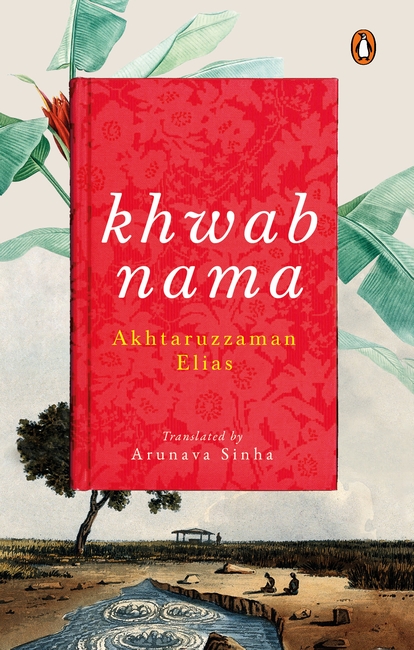
© 2020 Penguin India

“I would have considered myself blessed if I could have achieved a fraction of his quality in my writing” – Mahasweta Devi
Bengal in the 1940s. Having overcome the famine and the revolt of the sharecroppers, Bengal’s peasants are uniting. Work is scarce and wages are low. There is barely any food to be had. The proposal for the formation of Pakistan, the elections of 1946, and communal riots are rewriting the contours of history furiously. Amidst all this, in an unnamed village, a familiar corporeal spirit plunges into knee-deep mud. This is Tamiz’s father, the man in possession of Khwabnama.
At first glance, Khwabnama is the tale of a harmless young farmhand who becomes a sharecropper and dreams of a future that has everything to do with the land that he cultivates and the soil that he tills. The fabric of his dreams, though, have as much to do with the history of
the land as its future, and as much to do with memories as with hope.
In this magnum opus, which documents the Tebhaga movement, wherein peasants demanded two-thirds of the harvest they produced on the land owned by zamindars, Akhtaruzzaman Elias has created an extraordinary tale of magical realism, blending memory with reality, legend with history and the struggle of marginalized people with the stories of their ancestors.
Imprint: India Hamish Hamilton
Published: Jul/2021
ISBN: 9780670087211
Length : 552 Pages
MRP : ₹699.00
Imprint: Penguin Audio
Published:
ISBN:
Imprint: India Hamish Hamilton
Published: Jul/2021
ISBN:
Length : 552 Pages
MRP : ₹699.00
“I would have considered myself blessed if I could have achieved a fraction of his quality in my writing” – Mahasweta Devi
Bengal in the 1940s. Having overcome the famine and the revolt of the sharecroppers, Bengal’s peasants are uniting. Work is scarce and wages are low. There is barely any food to be had. The proposal for the formation of Pakistan, the elections of 1946, and communal riots are rewriting the contours of history furiously. Amidst all this, in an unnamed village, a familiar corporeal spirit plunges into knee-deep mud. This is Tamiz’s father, the man in possession of Khwabnama.
At first glance, Khwabnama is the tale of a harmless young farmhand who becomes a sharecropper and dreams of a future that has everything to do with the land that he cultivates and the soil that he tills. The fabric of his dreams, though, have as much to do with the history of
the land as its future, and as much to do with memories as with hope.
In this magnum opus, which documents the Tebhaga movement, wherein peasants demanded two-thirds of the harvest they produced on the land owned by zamindars, Akhtaruzzaman Elias has created an extraordinary tale of magical realism, blending memory with reality, legend with history and the struggle of marginalized people with the stories of their ancestors.
Akhtaruzzaman Elias (1943-97) was a Bangladeshi novelist and short-story writer who, despite writing only two novels, is regarded by most critics as being part of the pantheon of great Bengal authors. Chilekothar Sepai (1987) detailed the psychological journey of a man during the turbulent period just prior to Bangladeshi independence in 1971, and offered an unrivalled depiction of life in Puran Dhaka, an old town. Khwabnama (1996) depicts the sociopolitical scene in the rural pre-partition Bangladesh. His many awards include the Bangla Academy Award for Literature (1983), the Kazi Mahbubullah Gold Medal (1996) and the Ekushey Padak (posthumously, 1999).
Arunava Sinha (Translator)
Arunava Sinha translates classic, modern and contemporary Bengali fiction and non-fiction from Bangladesh and India into English. He also translates fiction from English into Bengali. Over eighty of his translations have been published so far in India, the UK and the USA. He teaches creative writing at Ashoka University, where he is also the co-director of the Ashoka Centre for Translation, and is the Books Editor at Scroll.in.
Akhtaruzzaman Elias’s literary piece titled Khwabnama is translated by Arunava Sinha from Bengali to English. In this magnum opus, Elias documents the Tebhaga movement, wherein peasants demanded two-thirds of the harvest they produced on the land owned by zamindars. Let us read this excerpt from Khwabnama in which Kulsum walks down the memory lane recalling her […]
